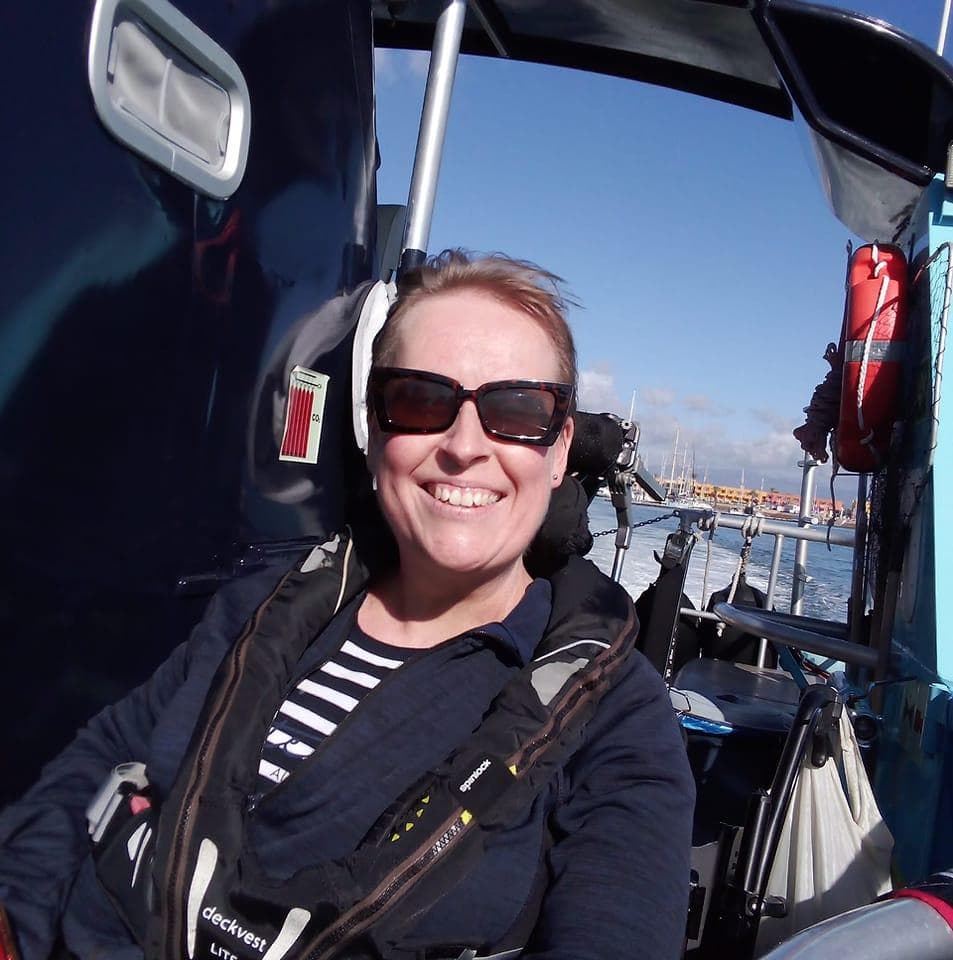Real-life stories
Meet Hanneke
Hanneke and the arbitrariness of SMA types.

Hanneke
Hanneke likes sports, singing in a choir, and going camping. Her biggest passion is sailing, which she does on her own boat, for fun, but also competitively. She loves seeing her friends, but time is always too short: as she says, living with disabilities can be a job in and of itself. First trained as a building engineer, Hanneke got interested in medical research and is now about to complete her PhD in epidemiology.
Forty-eight years old, Hanneke, who lives in the Netherlands, was diagnosed with SMA as a toddler. She was able to walk short distances until the age of 10, and to stand until 13, when she had surgery to correct her scoliosis. Today, Hanneke uses a powered wheelchair, equipped with arm rests that efficiently help her move her hands. However, she does not have access to any of the available medicines for SMA.
Her spinal surgery left no access to the spinal cord in the lumbar area, excluding the option of intrathecal injections. Being over 25 years old, Hanneke cannot receive reimbursement for the oral administration medicine based on the current policy in her country. Some adult patients with spinal issues receive the drug based on a compassionate use program, but this access is limited to patients diagnosed as Type 1 and 2. Since she was once a walker, Hanneke falls under the category of type 3A and is effectively excluded from access to medicines. This is a deep source of frustration:

Today, SMA type classification is falling out of favour. Based on motor milestones achieved in childhood, it is a poor predictor of outcomes in adult age. SMA is therefore better represented as a spectrum. Yet, disproven SMA types at an older age are still used as criteria for treatment access or reimbursement.
Falling at this intersection of multiple exclusion criteria is Hanneke. Hanneke, who is a very pragmatic person and understands that it might not always be possible for governments to reimburse such expensive drugs for everyone. She tries not to let her lack of access to medicines influence her life too much and she is happy that at least others can receive the drugs. Still, it is not always easy to face gradual function loss.

Still, Hanneke is not the type to feel sorry for herself and has a remarkable ability to think beyond. To her, the real problem are not individual access decisions, but rather, the whole system of drug development and commercialization. Especially in rare disease, drug prices are exorbitant and strain governments, who in turn have to enforce access restrictions. Patients are caught between a rock and a hard place. They need access to live or live better, but the system instrumentalises and capitalises on their condition. To Hanneke, this is just not sustainable:

To Hanneke, SMA is a privileged case where medicines are available and, increasingly, accessible to most. But much work is still to be done, and systemic change is necessary. As an epidemiologist, Hanneke sets a curious look onto the new and future landscape of SMA as the recent medical advances transform the community and change lives with SMA, hoping that further improvements come soon.
Interview conducted on 24 April 2024. This story was published on 16 July 2024. In May 2024, an agreement that will change access to SMA medicines in the Netherlands was reached. At present, the details of this agreement are currently being worked on. People living with SMA are waiting for the decision to come into effect, with the potential to finally change the access landscape to the better.
SMA is a spectrum disease. SMA types are an unreliable predictor for individual disease progression. No one should be excluded from treatment based on SMA type categorisation.
Stay updated!
Newsletter sign up
Keep up-to-date with the OdySMA project. Sign up to receive our digital newsletter
OdySMA is a participatory advocacy tool. Therefore SMA Europe cannot warrant the completeness, reliability, or absolute accuracy of the data shared on OdySMA, as there may be changes that our members and supporters do not immediately inform us of. Should you identify inaccuracies or omissions, please contact us and let us know. We count on you!